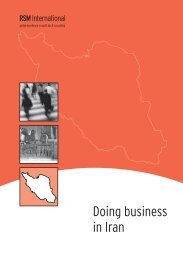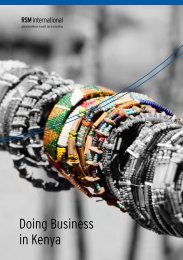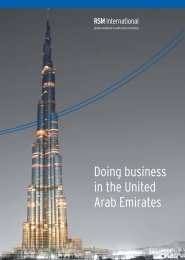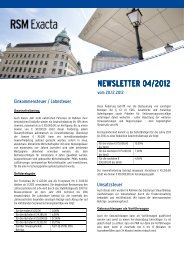Doing Business in India - RSM Austria
Doing Business in India - RSM Austria
Doing Business in India - RSM Austria
You also want an ePaper? Increase the reach of your titles
YUMPU automatically turns print PDFs into web optimized ePapers that Google loves.
paid up equity capital can be less than Rs. 100 million (about US$ 2.22 million), if the<br />
market capitalization of the applicant’s equity is not less than Rs. 1 billion (about US$<br />
22.23 million). However, <strong>in</strong> any case the paid up equity capital of the company shall<br />
not be less than Rs. 50 million (about US$ 1.11 million). A public limited company<br />
cannot make any allotment of shares unless a m<strong>in</strong>imum subscription of 90% of the<br />
issue amount has been subscribed. For cont<strong>in</strong>uation of list<strong>in</strong>g all listed companies<br />
should have non-promoter hold<strong>in</strong>g to the extent of 10% of the post issue capital (for<br />
an exist<strong>in</strong>g company which had <strong>in</strong> the past offered shares to the extent of 10%<br />
pursuant to the relevant regulations) or 25% for a new company.<br />
2.3 K<strong>in</strong>ds of Shares<br />
A public limited company is allowed to have only two classes of share capital viz.<br />
equity and preference shares.<br />
2.3.1 Equity shares are further divided <strong>in</strong>to shares with<br />
i. vot<strong>in</strong>g rights<br />
ii. with different rights as to dividend, vot<strong>in</strong>g or otherwise as per the rules<br />
prescribed.<br />
As per the Companies (Issue of Share Capital with Differential Vot<strong>in</strong>g Rights) Rules,<br />
2001, only such companies fulfill<strong>in</strong>g certa<strong>in</strong> basic criteria are allowed to issue shares<br />
with differential vot<strong>in</strong>g rights viz., three year track record of distributable profits,<br />
non default <strong>in</strong>ter alia <strong>in</strong> respect of fil<strong>in</strong>g of accounts, annual returns, repayment of<br />
deposits, redemption of debentures, payment of dividend. Approval of the<br />
shareholders for issu<strong>in</strong>g such shares should be obta<strong>in</strong>ed at a General Body Meet<strong>in</strong>g<br />
of the shareholders and <strong>in</strong> case of listed companies through system of postal ballot.<br />
Such shares, however, can be issued to the extent of 25% of the company’s total<br />
issued share capital only. So far as private limited company is concerned, there is no<br />
restriction on issue of shares of only two k<strong>in</strong>ds as mentioned above and also there is<br />
no restriction of issue of shares with disproportionate rights.<br />
2.3.2 Preference shares, which carry a pre-determ<strong>in</strong>ed coupon rate for payment of<br />
dividend each year can be of different types i.e. Cumulative, Non-cumulative,<br />
Convertible and Non-convertible. Only redeemable preference shares can be issued<br />
and the maximum period with<strong>in</strong> which shares should be redeemed should not<br />
exceed twenty years. Preference shareholders have vot<strong>in</strong>g rights only under certa<strong>in</strong><br />
given conditions like non-payment of dividends:<br />
i. <strong>in</strong> case of cumulative Preference shares, for an aggregate period of not<br />
less than two years and<br />
ii. <strong>in</strong> case of non-cumulative Preference shares, either for a period of two<br />
years immediately preced<strong>in</strong>g the commencement of meet<strong>in</strong>g of the<br />
shareholders or for an aggregate period of not less than three years.<br />
32<br />
DOING BUSINESS IN INDIA














